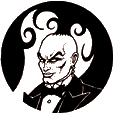| HOME | BOOKS | COMICS | RECORDS | NEWS | PEOPLE | PICTURES | ORDERS | HISTORY | office@savoy.abel.co.uk |
| LORD HORROR | MENG & ECKER | OTHER COMICS | COMICS ARTICLES | COMICS LINKS |
|
|
|||||||||
 As a result of popular—and consistent—request, we decided some time ago to put together a list detailing the considerable amount of cultural references in the Reverbstorm series. Some are relatively well known, especially to anyone
familiar with Modernist art and literature, others tend to be
more obscure, especially those from the more rarefied worlds of
Weird Fiction and Rock'n'Roll. Since it would be unreasonable
to expect every reader to share our own eclectic tastes, we can
at least throw some light on areas of (unintended) confusion;
those who still prefer an element of mystery to their enjoyment
are welcome to ignore these lists. As a result of popular—and consistent—request, we decided some time ago to put together a list detailing the considerable amount of cultural references in the Reverbstorm series. Some are relatively well known, especially to anyone
familiar with Modernist art and literature, others tend to be
more obscure, especially those from the more rarefied worlds of
Weird Fiction and Rock'n'Roll. Since it would be unreasonable
to expect every reader to share our own eclectic tastes, we can
at least throw some light on areas of (unintended) confusion;
those who still prefer an element of mystery to their enjoyment
are welcome to ignore these lists.
This appendix is only intended as an explanation of specific references in the comics. With some minor exceptions (the comments below concerning the title) no interpretation has been offered. We prefer questions of meaning in this series to remain the domain of the reader. John Coulthart
Interpretations of the title: 1—Paul Temple's lyrics: Reverbstorm was originally a song brought to Savoy by music journalist Paul
Temple. His article Savwarfare in the Savoy Wars CD booklet details his first encounter with Savoy, on a mission in 1986 to track down PJ Proby. No mere rock hack, with a prose style far better than the music rags deserve, Temple also had another life as founder member of the Wagnerian Soul Fraternity, an unhinged band of ether-jumping Northern Soul demons. Their whizz-fuelled exploits are described in another Temple article, Reverbstorm in The Adventures of Meng & Ecker. The lyrics of Reverbstorm (printed at the beginning of the series) are a WSF declaration
of intent dragged forcibly into Lord Horror's world. David Britton's
appropriation of the title and the reworking of the phrase 'jumping
the ether' set a pattern for the rest of the series. 2—Rock'n'Roll: The introduction of artificial reverberation to popular music
was one of the distinctive innovations of prime Rock'n'Roll (the
treatment of the vocals in Heartbreak Hotel, for example). Rock'n'Roll exemplifies artistic exaggeration;
raw physical energy (the storm) deliberately distorted and enhanced
(the reverb) to achieve maximum intensity. 3—The Nightmare of History: Walter Benjamin's famous piece from Illusions (quoted at the beginning of # 5) describes the angel of history
being blown backwards into the future by the storm of progress.
In this context the reverbstorm is an echo of the historical nightmare
which piles wreckage upon wreckage and sweeps holocausts across
the globe. This relates to James Joyce's words, also in # 5: 'History
is a nightmare from which I am trying to awake.' Ulysses (p.40). 4—Finnegans Wake (1939): James Joyce's final book (portions of which are scattered through
the series) is, amongst many things, a dream of history, explored
via the theories of Giovanni Battista Vico, an Italian philosopher
who saw the evolution of society as being governed by an endlessly
repeating cycle of events. In Vico's scheme, thunder is the voice
of God which inaugurates each new age of the cycle, causes men
to build shelters, which become communities and so lead to the
establishment of civilisation. The thunder also inspires the creation
of language as men try to imitate its sound. Here, then, we have a repeating cycle (reverb) announced by thunder
(storm). 5—The Waste Land (1922): In T S Eliot's poem, an important narrative feature in #5, the
fifth section is entitled 'What The Thunder Said'. This time the
thunder comes from the sacred Hindu Upanishads. In a fable, three separate groups (gods, demons and men) approach the creator Parajupti and ask him to speak. Each receive the same response from the Thunder, the divine voice—'DA'—yet each group interprets the statement in a different way. In this aspect, what the Thunder said, the voice of God, the Reverbstorm, is something which each person will interpret differently, a characteristic embodied in the title itself. It should also be noted here that The Waste Land is one of the most famous written examples of a work carefully
constructed of quotes from other works by different writers, a
form which the Reverbstorm series uses increasingly as it progresses. Finally, at the beginning of 'What The Thunder Said', Eliot connects
'reverb' and 'thunder' in the lines: 'Prison and palace and reverberation 6—Etymology: A reverberatorium is a furnace which operates by reflecting heat.
A reverbstorm then, would presumably be the torrent of smoke issuing
from furnace chimneys like those of the Torenbürgen crematoria. Breaking the word down unearths further interpretations: Re (about, or concerning) / Verbero (beat) / Verbum (word) Using 'verbero' could give: 'concerning the storm of beats'. Using 'verbum' gives: 'concerning the storm of words'. The literary
tempest of Finnegans Wake and the thunder of Lord Horror's propaganda, vilification and abuse. •
|
|
|
| SAVOY • 456 WILMSLOW ROAD, WITHINGTON, MANCHESTER, M20 3BG, UK • Phone: +44 (0) 161 445 5771 |






